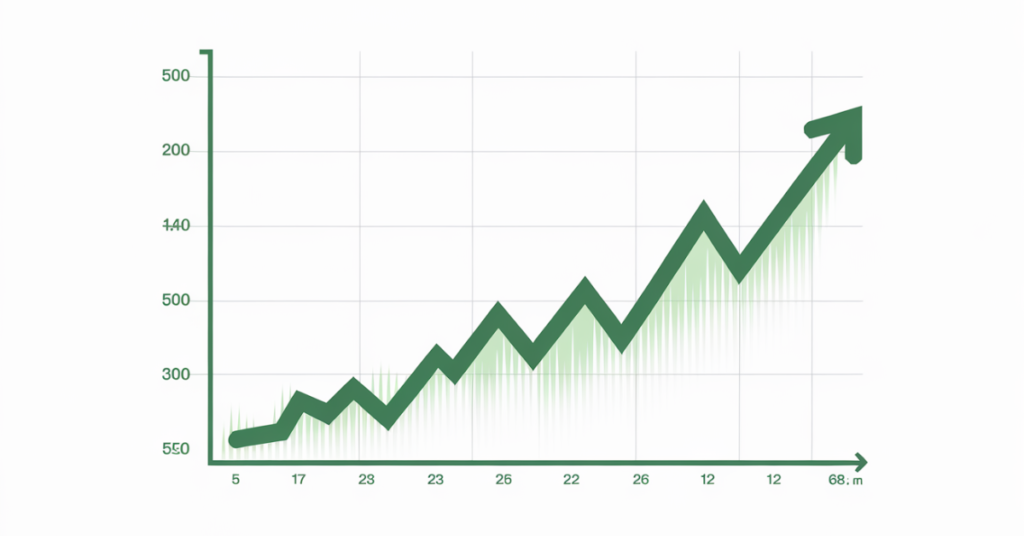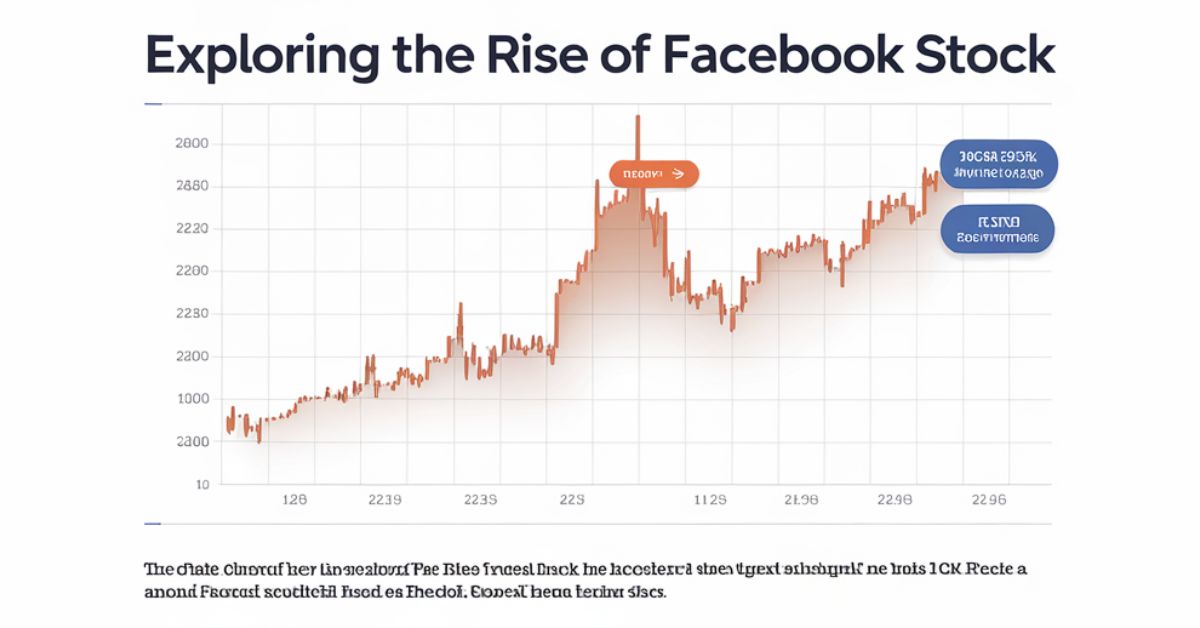In the ever-evolving landscape of tech stocks, few have captured the imagination of investors quite like Facebook. From its humble beginnings in a Harvard dorm room to its current status as a global tech titan, Facebook’s journey on the stock market has been nothing short of remarkable.
This article delves deep into the factors driving Facebook’s stock performance, leveraging the insightful analysis provided by FintechZoom, a leading financial technology platform. Exploring the Rise of Facebook Stock Through FintechZoom.
The Evolution of Facebook Stock
Facebook’s stock market journey began with its highly anticipated Initial Public Offering (IPO) on May 18, 2012. The company priced its shares at $38, valuing the social media giant at $104 billion – the largest valuation for a newly public company at the time. However, the early days of Facebook as a public company were not without challenges. Exploring the Rise of Facebook Stock Through FintechZoom.
Facebook’s IPO and Early Years
The IPO itself was marred by technical glitches on the NASDAQ exchange, leading to confusion among investors and traders. In the weeks following the IPO, Facebook’s stock price tumbled, dropping below $20 per share by August 2012. This rocky start led many to question the company’s true value and its ability to monetize its growing user base. Exploring the Rise of Facebook Stock Through FintechZoom.
Key Challenges in Early Years:
- Uncertainty about mobile advertising potential
- Concerns about user privacy and data handling
- Competition from other social media platforms
Despite these initial setbacks, Facebook’s leadership, spearheaded by CEO Mark Zuckerberg, remained focused on long-term growth strategies. This persistence would eventually pay off, as the company began to demonstrate its ability to generate significant revenue from mobile advertising.
Key Milestones Impacting Stock Price

Facebook’s stock price has been significantly influenced by strategic acquisitions and user growth milestones. Let’s examine some of the most impactful events:
- Instagram Acquisition (2012): Purchased for $1 billion, this acquisition initially seemed overpriced but has since proven to be one of the most shrewd moves in tech history.
- WhatsApp Acquisition (2014): The $19 billion deal for the messaging app raised eyebrows but solidified Facebook’s dominance in global communication.
- Oculus VR Acquisition (2014): This $2 billion purchase signaled Facebook’s ambitions beyond traditional social media, laying the groundwork for its future metaverse focus.
- Reaching 1 Billion Daily Active Users (2015): This milestone demonstrated Facebook’s unparalleled global reach and engagement.
- Launch of Facebook Marketplace (2016): This feature opened new e-commerce opportunities, diversifying revenue streams.
Each of these milestones contributed to investor confidence and helped drive the stock price upward over time. Exploring the Rise of Facebook Stock Through FintechZoom.
Recent Performance and Market Cap Milestones
Facebook’s stock performance in recent years has been nothing short of stellar. In June 2021, the company’s market capitalization surpassed $1 trillion for the first time, joining an elite club of tech giants. This achievement came as the stock price reached an all-time high of over $350 per share. Exploring the Rise of Facebook Stock Through FintechZoom.
Table: Facebook’s Market Cap Milestones
| Date | Market Cap Milestone | Stock Price (Approx.) |
|---|---|---|
| May 2012 | $104 billion (IPO) | $38 |
| July 2017 | $500 billion | $172 |
| June 2021 | $1 trillion | $355 |
While Facebook has not implemented any stock splits to date, the consistent growth in share price has made it an attractive option for both institutional and retail investors. Exploring the Rise of Facebook Stock Through FintechZoom.
Key Drivers of Facebook Stock Performance
Understanding the factors behind Facebook’s stock performance is crucial for investors looking to make informed decisions. FintechZoom’s analysis highlights several key drivers that have contributed to the company’s success in the stock market.
Revenue Growth and Diversification
Facebook’s ability to consistently grow its revenue has been a primary factor in its stock performance. The company’s main revenue source remains advertising, but it has shown impressive growth and adaptability in this area. Exploring the Rise of Facebook Stock Through FintechZoom.
Key Revenue Trends:
- Mobile advertising now accounts for over 90% of total ad revenue
- Average Revenue Per User (ARPU) has steadily increased globally
- Expansion into new ad formats, including video and Stories
Moreover, Facebook has been actively diversifying its revenue streams. The launch of Facebook Shops in 2020 marked a significant push into e-commerce, allowing businesses to set up online stores across Facebook and Instagram. This move not only opens up new revenue opportunities but also strengthens Facebook’s value proposition to advertisers.
User Engagement Metrics
User engagement remains a critical factor in Facebook’s success. Despite concerns about privacy and competition from newer platforms, Facebook’s family of apps (including Instagram, WhatsApp, and Messenger) continues to see strong user growth and engagement.
As of Q2 2023:
- Daily Active Users (DAUs): 2.06 billion
- Monthly Active Users (MAUs): 3.03 billion
These figures represent year-over-year increases of 5% and 3% respectively, demonstrating Facebook’s continued ability to attract and retain users.
Technological Innovations
Facebook’s investments in cutting-edge technologies have played a significant role in maintaining its competitive edge and driving stock performance. Two areas of particular focus have been Artificial Intelligence (AI) and Augmented/Virtual Reality (AR/VR).
AI Applications at Facebook:
- Content moderation and policy enforcement
- Personalized ad targeting and user experience
- Language translation and accessibility features
In the AR/VR space, Facebook’s Oculus brand has established itself as a leader in consumer virtual reality. The success of the Oculus Quest 2 headset and Facebook’s broader vision for the metaverse have excited investors about the company’s future growth potential.
FintechZoom’s Insightful Coverage

FintechZoom has emerged as a valuable resource for investors seeking to understand Facebook’s stock performance. Their comprehensive analysis combines technical indicators with fundamental research to provide a holistic view of the stock’s potential.
Overview of FintechZoom’s Analysis Methodology
FintechZoom employs a multi-faceted approach to analyzing Facebook stock:
- Technical Analysis: Utilizing chart patterns, moving averages, and other technical indicators to identify trends and potential entry/exit points.
- Fundamental Analysis: Examining Facebook’s financial statements, growth metrics, and competitive position within the tech industry.
- Sentiment Analysis: Monitoring market sentiment through social media trends, news coverage, and analyst reports.
- Comparative Analysis: Benchmarking Facebook’s performance against other tech giants and social media competitors.
This comprehensive methodology allows FintechZoom to provide nuanced insights that go beyond simple buy/sell recommendations.
Key Insights Provided by FintechZoom
FintechZoom’s analysis of Facebook stock has highlighted several key insights:
- Strong Financial Health: Facebook’s robust balance sheet and consistent free cash flow generation provide a solid foundation for future growth and investments.
- Ad Revenue Resilience: Despite challenges like Apple’s iOS privacy changes, Facebook has demonstrated adaptability in its ad business, maintaining strong growth.
- Metaverse Potential: While still in its early stages, Facebook’s investments in the metaverse represent a significant long-term growth opportunity.
- Regulatory Risks: FintechZoom consistently monitors the regulatory landscape, providing updates on how potential regulations could impact Facebook’s business model and stock performance.
These insights, combined with real-time stock data and expert commentary, make FintechZoom a valuable tool for investors exploring Facebook stock.
The Evolution of Facebook to Meta
In October 2021, Facebook Inc. rebranded itself as Meta Platforms, Inc., marking a significant shift in the company’s vision and strategy. This move, aimed at aligning the company’s brand with its focus on building the metaverse, has had a notable impact on investor perception and stock performance.
Rebranding Strategy and Rationale
The rebranding to Meta represents more than just a name change. It signifies the company’s commitment to shaping the future of digital interaction and commerce. CEO Mark Zuckerberg envisions the metaverse as the next evolution of social connection, a virtual space where people can work, play, and interact in immersive 3D environments.
Key Components of Meta’s Vision:
- Virtual and augmented reality experiences
- Digital avatars and virtual goods
- Interconnected digital economies
- New forms of social interaction and collaboration
This pivot towards the metaverse is seen as a proactive move to position the company at the forefront of the next major computing platform.
Investor Reaction to the Meta Pivot
The initial investor reaction to the Meta rebrand was mixed. In the short term, the stock experienced some volatility as the market digested the implications of this strategic shift. Some investors expressed concern about the massive investments required to build the metaverse infrastructure, while others were excited about the long-term growth potential.
FintechZoom’s analysis of stock performance post-announcement revealed:
- An initial dip in stock price immediately following the announcement
- Gradual recovery as investors gained clarity on the metaverse strategy
- Increased trading volume, indicating heightened investor interest
The long-term outlook remains positive, with many analysts viewing the metaverse focus as a potential catalyst for future growth. However, FintechZoom cautions that the full impact of this strategic shift may take years to materialize in terms of revenue and stock performance.
Key Drivers of FB Stock
Understanding the fundamental drivers of Facebook (now Meta) stock is crucial for investors looking to make informed decisions. FintechZoom’s analysis highlights several key factors that continue to influence the stock’s performance.
Advertising Revenue Growth
Despite the rebranding to Meta, advertising remains the primary revenue driver for the company. Facebook’s ability to deliver highly targeted ads across its family of apps has made it a go-to platform for advertisers of all sizes.
Notable Advertising Trends:
- Continued dominance in mobile advertising
- Increasing adoption of video ad formats
- Growth in e-commerce-related advertising
FintechZoom’s data shows that Facebook’s average revenue per user (ARPU) has consistently grown year-over-year, particularly in North America and Europe.
User Data and Privacy Concerns
Privacy issues have been a double-edged sword for Facebook. On one hand, the company’s vast trove of user data is a key competitive advantage, allowing for precise ad targeting. On the other hand, privacy scandals and regulatory scrutiny have posed significant challenges.
Timeline of Major Privacy Challenges:
- 2018: Cambridge Analytica scandal
- 2019: $5 billion FTC fine for privacy violations
- 2021: Apple’s iOS privacy changes impacting ad targeting
FintechZoom’s analysis indicates that while these issues have caused short-term volatility in the stock price, Facebook has thus far been able to adapt its business model to address privacy concerns without significantly impacting its bottom line.
International Expansion
Growth in emerging markets has been a key driver of Facebook’s user growth and, by extension, its stock performance. The company has made significant investments in tailoring its platforms to local markets and overcoming infrastructure challenges.
Key Growth Markets:
- India: Largest user base with over 400 million users
- Brazil: Second-largest market outside the U.S.
- Indonesia: Rapidly growing user base with high engagement
FintechZoom notes that while ARPU in these markets is lower than in North America and Europe, the sheer scale of the user base presents significant long-term revenue potential.
Risks and Challenges
While Facebook (Meta) stock has shown remarkable growth, it’s not without its risks and challenges. FintechZoom’s comprehensive analysis highlights several key areas of concern for investors.
Regulatory Scrutiny and Antitrust Concerns
Facebook faces increasing regulatory pressure globally, with concerns ranging from antitrust issues to content moderation and data privacy.
Major Regulatory Challenges:
- U.S. antitrust investigations into Facebook’s acquisitions and market dominance
- EU’s Digital Markets Act, potentially limiting Facebook’s ability to leverage user data across its platforms
- Calls for stricter content moderation and platform liability laws
FintechZoom’s analysis suggests that while Facebook has thus far navigated regulatory challenges successfully, future regulations could potentially impact its business model and growth prospects.
Platform Safety and Content Moderation
The challenge of moderating content across Facebook’s massive platforms has been a persistent issue, affecting user trust and attracting regulatory attention.
Key Content Moderation Challenges:
- Misinformation and fake news propagation
- Hate speech and extremist content
- Election integrity concerns
Facebook has made significant investments in AI-powered content moderation tools and human moderators. However, FintechZoom notes that content-related controversies continue to pose reputational risks that can impact stock performance.
Competition in Social Media and Tech Space
While Facebook remains dominant, it faces increasing competition from both established tech giants and newer platforms.
Notable Competitors:
- TikTok: Rapidly growing short-form video platform
- Snapchat: Popular among younger demographics
- Twitter: Competing for user attention and ad dollars
- Google and Apple: Competing in various areas, including digital advertising and AR/VR
FintechZoom’s analysis highlights that while Facebook has successfully fended off competition thus far, the dynamic nature of the tech industry means that competitive threats must be continually monitored.
Strategic Investments and Future Prospects
Looking ahead, Facebook’s (Meta’s) future stock performance will likely be influenced by its strategic investments and ability to capitalize on emerging technologies. FintechZoom’s analysis provides insights into key areas of focus for the company.
Metaverse Development and Potential
The metaverse represents Facebook’s bold bet on the future of digital interaction. While still in its early stages, the potential impact on the company’s long-term growth is significant.
Key Metaverse Initiatives:
- Oculus VR hardware development
- Horizon Worlds virtual social platform
- Digital avatar and identity systems
- Virtual commerce and digital goods
FintechZoom notes that while the metaverse presents enormous potential, it also requires massive upfront investments. The success of this initiative will likely be a key driver of stock performance in the coming years.
AI and Machine Learning Initiatives
Facebook continues to invest heavily in AI and machine learning technologies, which underpin many of its core products and services.
AI Applications at Facebook:
- News Feed personalization
- Ad targeting and optimization
- Content moderation and policy enforcement
- Language translation and accessibility features
FintechZoom’s analysis suggests that Facebook’s AI capabilities provide a significant competitive advantage, enabling the company to improve user experience and ad effectiveness continually.
Diversification Beyond Social Media
While social media remains its core business, Facebook is actively diversifying into new areas to drive future growth.
Key Diversification Efforts:
- E-commerce: Facebook Shops, Instagram Shopping
- Fintech: Development of the Diem cryptocurrency (formerly Libra)
- Enterprise communication: Workplace by Facebook
FintechZoom highlights that successful diversification could open up new revenue streams and reduce Facebook’s dependence on advertising revenue.
Conclusion
As we’ve explored through FintechZoom’s comprehensive analysis, the rise of Facebook stock has been driven by a combination of robust user growth, advertising dominance, strategic acquisitions, and investments in future technologies. The company’s evolution from a simple social networking site to a diversified tech giant now rebranded as Meta, reflects its ambition to shape the future of digital interaction.
Looking ahead, Facebook (Meta) faces both significant opportunities and challenges. The development of the metaverse represents a bold vision for the future, but it comes with substantial investment requirements and uncertain returns. Regulatory pressures and privacy concerns continue to pose risks, while competition in the tech space remains fierce.
FAQs
- What factors have contributed most to Facebook’s stock rise?
Facebook’s stock rise has been primarily driven by its dominant position in digital advertising, consistent user growth across its family of apps, successful monetization strategies, and strategic acquisitions like Instagram and WhatsApp. - How has FintechZoom’s coverage influenced investor perception of FB stock?
FintechZoom’s comprehensive analysis provides investors with detailed insights into Facebook’s financial performance, technical indicators, and market sentiment. This in-depth coverage helps investors make more informed decisions by offering a holistic view of the stock’s potential. - What are the potential risks to Facebook’s stock performance shortly?
Key risks include regulatory challenges, privacy concerns, competition from other social media platforms, and the uncertain returns on massive investments in areas like the metaverse. - How might the metaverse impact Facebook’s long-term stock value?
While the metaverse presents significant long-term potential for new revenue streams and user engagement, it also requires substantial upfront investment. The impact on stock value will likely depend on Facebook’s ability to execute its vision and monetize these new virtual environments effectively. - What key metrics should investors watch when evaluating Facebook stock?
Important metrics include Daily and Monthly Active Users (DAU/MAU), Average Revenue Per User (ARPU), advertising revenue growth, progress in metaverse-related initiatives, and regulatory developments. FintechZoom regularly updates these metrics in its analysis of Facebook stock.



